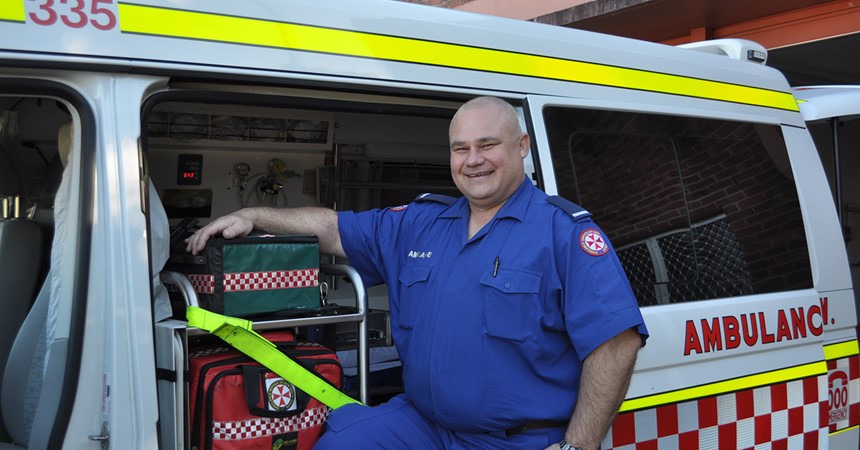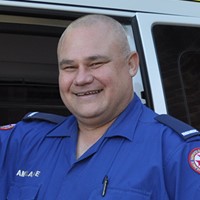I grew up in Mayfield West in a large family – Mum, Dad (now deceased) and six boys (my only sister was stillborn). When I completed Year 10 in 1979, I didn’t really know what I wanted to do in life. I went in search of an opportunity and became an apprentice butcher. However, this was so repetitive I found myself frustrated and soon knew that long term, this work wasn’t for me.
At the age of 21, in the butcher shop, I realised I was going to become a paramedic. It was like someone flicked on a light and I could see exactly what my future career would be. It would, however, take a further 12 years to achieve my goal, as I left butchery and became involved in hospitality. I really enjoyed the buzz, excitement and social aspects of the hospitality industry. My youngest brother and I managed a busy restaurant and have fond memories of the time.
In 1997 I joined what was then called the Ambulance Service of NSW.
After seven weeks initial training in Rozelle, Sydney, I worked on the road with a number of different training officers (mentors) around North Sydney and the Central Coast. After 12 months, I returned to the Education Centre for five weeks for the next phase of training. On completion, I was posted to Cessnock Ambulance Station. Here I completed my training to become a qualified paramedic, remaining there for the next 16 years.
During this period I worked with some of the best senior paramedics around. It was a fun place to work, where great camaraderie, lifelong friendships, trust and enormous respect for those senior paramedics would be forged. There were plenty of laughs and good times, there were also tears of sadness after attending tragic situations; motor vehicle crashes, suicides, infant death from SIDS, or murders.
Many people think being a paramedic is very upsetting due to serious injuries and the trauma we face, but this isn’t always the case. While the horrific impact of seeing people, including children, severely injured in fatal accidents is confronting, and at times difficult to come to terms with, that isn’t the most distressing part of our job.
By far the most devastating, confronting and difficult role as a paramedic is dealing with other people’s emotions. It’s the handing back of the deceased eight-monthold baby boy to the distraught parents after being called because the baby isn’t breathing. As you walk through the front door, you’re handed this lifeless little bundle and then, after an assessment, you realise there’s nothing that can be done to revive the child. Having to inform the young parents their son is dead and hand the child back leaves you feeling totally helpless as the family begins a spiralling journey of grief, disbelief and loss. It’s this outpouring of very personal, raw, inconsolable and tangible emotion that can be difficult to come to terms with. It is hard to remain professional, empathetic and supportive without becoming emotionally affected by the situation.
There once was a call to attend children stabbed by their mentally ill mother. After placing a blanket around one child and carrying her to the ambulance, she gave me a big bear cuddle around the neck and, shaking with fear, looked at me through big sad teary eyes and asked with a scared and trembling voice, “Do you think my mummy loves me?”.
I wasn’t able to answer her. Instead, I just held her tight. She then asked “Is my mummy trying to kill us?” and again, I couldn’t answer. I looked her in the eyes, fighting back tears and told her she was “safe now, and I will look after you.”
There are many, many more examples of such sadness and the emotion paramedics are confronted with on a daily basis. People often ask how we do our jobs, and the answer is that at times it is very difficult.
There are the nightmares, being woken up by my partner because I am crying in my sleep and the constant feeling and fear that something really bad is about to happen. These are all elements of Post-Traumatic Stress Disorder (PTSD), something many paramedics and other emergency workers live with. PTSD is like a shadow – it’s always with you, sometimes more obvious than others but it’s never far away.
So how do we as paramedics deal with these stresses? For me personally I get great benefit from chatting to other paramedics. They know what you’re talking about and how you’re feeling. NSW Ambulance provides a number of avenues of assistance open 24/7, like the Ambulance Chaplain, Peer Debriefers (other paramedics trained to assist in times of distress) and employee assistance program (EAP), which is an external professional counselling service. I do feel there is still a long way to go before we achieve best practice, but I feel we are slowly heading in the right direction. Time will tell.
I guess one might be forgiven for thinking the role of a paramedic is one of doom and gloom, but it’s far from it. What is mentioned above is a snapshot of some of the challenges we face day to day.
However, every coin has two sides and there is another side to our work. Saving a patient from a cardiac arrest or a severe anaphylactic (allergic) reaction, reviving a child who’s almost drowned or rescuing someone critically injured and trapped in a serious car accident; these are incredibly rewarding.
One of the most amazing things about being a paramedic is that when you go to work you never know what you are going to do, every day is different. You might deliver a baby in the bathroom of someone’s house, take an elderly patient from a nursing home to hospital for an x-ray, transfer a patient from one hospital to another for specialist treatment, attend to a tradesman who’s fallen six metres off scaffolding, transport a man suffering from mental health issues to a psychiatric unit for treatment, then attend a car crash that turns out to be a triple fatality. All this in 12 hours.
Being a paramedic remains one of the most rewarding, challenging and trusted professions available.
For more information on a career as a paramedic, visit ambulance.nsw.gov.au.























































































